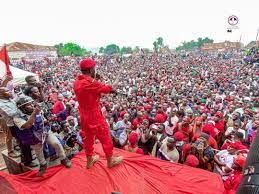By our reporter.
The National Unity Platform (NUP) has confirmed September 23, 2025, as the day its flag bearer, Robert Kyagulanyi Ssentamu (Bobi Wine), will be nominated by the Independent Electoral Commission (IEC) to contest in Uganda’s 2026 presidential elections.
The IEC’s official road map earmarked September 23 and 24, 2025, as the designated dates for presidential nominations at its new site headquarters in Lweza, Ssaabagabo, Makindye Division.
Kyagulanyi’s Planned Post-Nomination Rallies
Following his nomination, Kyagulanyi is scheduled to hold two rallies—first in Nateete and later in Katwe—both Kampala suburbs renowned for their vibrant support of the opposition. These rallies are expected to draw massive crowds, adding to the charged atmosphere along the Entebbe–Kampala highway and within Lweza, where the nomination venue is located.
High Security and Presidential Protocol Along Entebbe Highway
Traditionally, whenever President Museveni is expected at any venue, the state rolls out elaborate security protocols, including a minimum of two days of advance preparation. Roads are often sealed off, and heavy security deployment is routine. With both Museveni and Kyagulanyi expected at the same nomination venue within the two-day window, tensions and logistical disruptions along the Entebbe–Kampala corridor appear inevitable.IEC and Stakeholder Synchronisation
When contacted by Uganda Today, IEC spokesperson Julius Mucunguzi noted that while NUP has the liberty to choose its nomination date, the IEC must “synchronise with other stakeholders, including the President, who is also due for nomination.”
This underscores the delicate balancing act the IEC faces in managing a process where the incumbent head of state doubles as a presidential contender.
Museveni’s Uneven Playing Field
President Yoweri Kaguta Museveni, who has ruled Uganda for nearly 40 years, is once again the flag bearer of the National Resistance Movement (NRM). Unlike other contenders, Museveni enjoys the trappings of the presidency even while seeking re-election—an issue that has repeatedly drawn criticism from both domestic opposition and international observers.The Supreme Court, following election petitions since 2001, has consistently recommended reforms to level the electoral playing field. One of the key proposals was to strip the incumbent of presidential privileges at least five months before nominations. However, Museveni has never implemented these reforms, further entrenching the imbalance between him and his challengers.
Historical Context of Unfair Contestations
Uganda’s presidential elections have long been marred by allegations of bias and state interference. The two-decade-long rivalry between Museveni and his archrival Dr. Kizza Besigye, now incarcerated, epitomised the struggle for fair competition. Even earlier, the late Paul Kawanga Ssemogerere contested against Museveni under similarly uneven circumstances.
Kyagulanyi’s entry into this long-running struggle reflects a generational demand for change, though he faces the same entrenched obstacles that hampered his predecessors.
What Lies Ahead
As Uganda edges closer to the 2026 polls, the nomination of Kyagulanyi on September 23 will mark a defining moment. The charged political climate, the security-heavy nomination venue, and the continued dominance of Museveni’s incumbency will shape both the spectacle and substance of the coming elections.
Whether the IEC can manage this process transparently and equitably remains a question that will test the integrity of Uganda’s electoral system once again.

